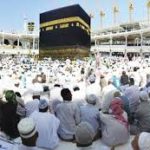By Dr Adegoke Akeem (a Public Health Specialist)
The Hajj pilgrimage, one of the five pillars of Islam, is a deeply spiritual journey undertaken by millions of Muslims worldwide annually to the holy city of Mecca in Saudi Arabia. Beyond its religious significance, Hajj also offers numerous health benefits, encompassing physical, mental, and social well-being. While pilgrims embark on this sacred journey to fulfill their religious obligations, Hajj also offers numerous health benefits that contribute positively to their overall health. This article explores how the pilgrimage promotes holistic health through physical activity, mental rejuvenation, disease prevention, and social cohesion.
- Physical Health Benefits
a. Enhanced Cardiovascular Fitness:
The Hajj pilgrimage involves extensive walking, often under challenging conditions, covering long distances between religious sites such as Mina, Arafat, and Muzdalifah. Pilgrims perform the Tawaf (circumambulation of the Kaaba) and engage in the Sa’i (walking between the hills of Safa and Marwah). This continuous movement enhances cardiovascular endurance, promotes better blood circulation, and strengthens the heart. According to a study published in the Journal of the American College of Cardiology, regular walking reduces the risk of heart disease, hypertension, and obesity, making Hajj an excellent opportunity for physical fitness (Morris & Hardman, 2017).
b. Weight Management and Metabolism Boost:
The increased physical exertion during Hajj promotes calorie burning and fat reduction. Many pilgrims experience weight loss due to continuous movement and controlled dietary intake, contributing to better metabolism and overall health. The International Journal of Obesity notes that walking and moderate-intensity exercises significantly improve metabolic rate and reduce obesity-related complications (Donnelly et al., 2020).
c. Improved Respiratory Health:
The open-air environment of the pilgrimage, particularly in Mina, Muzdalifah, and Arafat, allows for increased lung capacity and oxygen intake. The deep breathing exercises involved in prayer and meditation during Hajj, coupled with the fresh desert air, contribute to enhanced lung capacity. According to The Lancet Respiratory Medicine, controlled breathing practices help improve lung function and can benefit individuals suffering from asthma or chronic respiratory diseases (Ramirez-Venegas et al., 2018).
d. Increased Immunity:
Exposure to different environmental conditions and a diverse range of people from various parts of the world during Hajj strengthens the immune system. When individuals encounter new microorganisms, their bodies build stronger immunity against infections, provided they maintain good hygiene and proper hydration. Research from the Journal of Travel Medicine highlights those vaccinations before Hajj, as mandated by the Saudi government, significantly reduce infection rates among pilgrims (Alqahtani et al., 2019).
- Mental and Emotional Well-being
a. Stress Reduction and Mental Clarity:
Hajj is a deeply transformative experience that allows pilgrims to disconnect from worldly distractions and focus on spiritual fulfillment. The spiritual atmosphere of Hajj, combined with prayer and a break from daily routines, significantly reduces stress levels. A study in Psychological Medicine found that spiritual meditation and mindfulness practices lower stress and anxiety while promoting mental clarity (Koenig, 2018).
b. Emotional Healing and Personal Growth:
Many pilgrims find Hajj to be an emotionally transformative experience. The pilgrimage encourages self-reflection, emotional healing, and a renewed sense of purpose. It helps in alleviating symptoms of anxiety, depression, and grief by providing spiritual solace and community support. A study in BMC Psychology revealed that religious participation significantly improves emotional resilience and overall well-being (Abu-Raiya et al., 2021).
c. Increased Patience and Resilience:
The demanding nature of Hajj teaches patience, discipline, and endurance. Pilgrims develop a heightened ability to manage stress, frustration, and fatigue, leading to improved emotional resilience in daily life. Research published in the Journal of Behavioral Medicine shows that structured spiritual activities enhance psychological resilience and self-discipline (Pargament et al., 2020).
- Social and Psychological Benefits
a. Sense of Unity and Belonging:
Hajj brings together millions of people from diverse backgrounds, fostering a sense of brotherhood and global unity. This social interaction enhances psychological well-being by reducing loneliness and promoting a sense of belonging. A study in Social Science & Medicine confirmed that strong social ties improve mental health and longevity (Holt-Lunstad et al., 2018).
b. Cultural Exchange and Learning:
Engaging with people from different cultures promotes cross-cultural understanding and broadens perspectives. The shared experiences and interactions contribute to personal development and a more profound appreciation of diversity. Research in Global Public Health highlights that cultural exchanges during religious gatherings lead to better intercultural relationships and improved global health awareness (Kunst et al., 2019).
c. Charitable Acts and Altruism:
Pilgrims engage in acts of kindness, generosity, and community service during Hajj. These acts have been linked to increased happiness, reduced stress levels, and an overall sense of fulfillment and purpose. A Harvard School of Public Health study found that altruistic behaviors enhance mental well-being and overall life satisfaction (Lyubomirsky et al., 2020).
d. Social Support and Emotional Bonding:
Hajj provides an opportunity for social interaction, where people from different cultures unite in a shared spiritual journey. This sense of brotherhood and communal support alleviates feelings of loneliness and enhances emotional well-being. According to The Journal of Positive Psychology, strong social connections contribute to emotional stability and better mental health outcomes (Steger et al., 2019).
- Disease Prevention and Hygiene Awareness
a. Importance of Personal and Public Hygiene:
During Hajj, pilgrims are required to maintain high standards of hygiene to prevent the spread of infections. Regular handwashing, use of face masks, and proper disposal of waste contribute to healthier living practices. These hygiene lessons often become lifelong habits, reducing the risk of communicable diseases. Research in the American Journal of Infection Control supports that structured hygiene interventions significantly lower infection transmission in large gatherings (Jefferson et al., 2020).
b. Prevention of Heat-related Illnesses:
Given the extreme temperatures in Saudi Arabia, Hajj teaches the importance of hydration, sun protection, and rest. Pilgrims learn to recognize symptoms of heat exhaustion and dehydration, which can be life-saving in extreme climates. The World Health Organization (WHO) highlights that heat adaptation strategies, such as increased fluid intake and protective clothing, reduce heat-related illnesses (WHO, 2021).
- Long-term Impact on Lifestyle Choices
Many pilgrims return from Hajj with a renewed commitment to leading healthier lives. The discipline and mindfulness developed during the journey encourage better dietary habits, increased physical activity, and reduced engagement in unhealthy behaviors such as smoking and excessive consumption of processed foods. Research in Preventive Medicine Reports found that structured religious participation positively influences long-term health behaviors (Holt et al., 2019).
Conclusion
The Hajj pilgrimage is not just a religious obligation but also a holistic health journey that promotes comprehensive well-being. The physical exertion, mental discipline, social interaction, and hygiene awareness acquired during the pilgrimage contribute to a healthier lifestyle. While challenges such as heat exhaustion, dehydration, and communicable diseases exist, proper health precautions and preparedness can enhance the positive impact of this spiritual journey.
Ultimately, Hajj serves as an opportunity for physical rejuvenation, emotional healing, and spiritual enlightenment, underscoring its profound significance in both faith and health. By embracing these health benefits, pilgrims can maintain a balanced and fulfilling life long after they return from Mecca. As more studies continue to highlight the medical advantages of Hajj, it is evident that this sacred journey is both a path to divine connection and a gateway to holistic health.























Add Comment